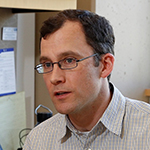James Lloyd-Smith

I am interested in the ecology and evolution of infectious diseases, and I build mathematical models of disease spread and test them against epidemiological data to better understand disease dynamics. From HIV to pandemic influenza, most infectious diseases of humans originate in other animal species, and many (like rabies or West Nile virus) cross the animal-human boundary all the time. These shared animal-human pathogens, known as zoonoses, impose heavy health burdens worldwide and are difficult to study and control because of their complex ecology. For example, they often have multiple host species interwoven with complex environmental influences. Mathematical models are a vital tool to tackle this complexity. In a recent study I led a team of scientists in an effort to identify shared patterns among zoonotic infections and set priorities for future research. We found that models have helped build basic understanding and health policy for infections like SARS, pandemic flu, and “mad cow” disease. However, we also found that research efforts have been heavily skewed to these particular diseases, and that little or no work has been done on many other globally significant diseases. There are also important gaps in modeling of crucial processes such as animal-to-human disease transmiss and the rapid evolution of pathogens once they’re circulating among humans. We have proposed steps for the research community to address these shortcomings and propel the global fight against zoonoses – and I am pursuing these aims in my lab at UCLA, where I work on zoonose such as SARS, human monkeypox and leptospirosis.
